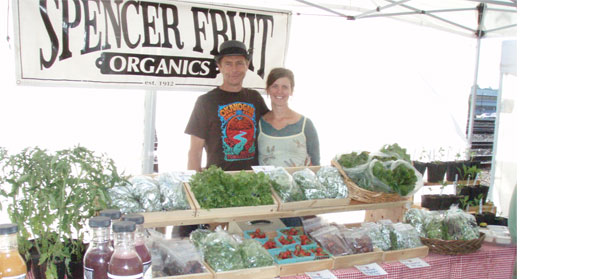

Jul 23, 2012Local sales thrive at Wenatchee farmers’ market
Wenatchee Valley Farmers Market has been around since 1979, but never had a permanent home.
“We’ve been gypsies, somewhat,” said Jennifer Wiecking, the market’s executive director.
That wandering lifestyle will change next year, when the farmers’ market joins the Pybus Public Market, a former steel warehouse in Wenatchee, Wash., that’s being renovated to house growers, craftsmen and other local businesses and organizations. The farmers’ market will be on the outside of the building, right next to the Columbia River. Some of the vendors will move inside during the offseason, Wiecking said.
In the meantime, Wenatchee Valley Farmers Market is still on Columbia Street, where it’s been since 2010 – the year Wiecking joined. From what she’s heard, two years is a long time for the market to be in one location. Wherever it goes, however, its dedicated customers find it, she said.
Indeed, despite its extreme mobility, the market has grown over the years. When it opened May 19, there were 30 vendors – triple the count on past opening days. There are nearly 70 vendors at peak season, when up to 5,000 people visit on Saturdays. The market did about $234,000 in sales in 2010, growing to $343,000 the next year. Seventy percent of the sales are made by growers, with the rest by vendors who sell meats, cheeses, crafts and other items, Wiecking said.
The market is open Wednesdays and Saturdays, along with also Thursdays in a second location. A lot of the customers are local, but there are plenty of tourists, too. Many come from the Seattle area, visiting Lake Chelan and hitting local wineries and restaurants on the way. Tourism is becoming a bigger draw for the Wenatchee region. The Pybus market should boost that trend even more, she said.
The Wenatchee region is known for large fruit growers who ship their products far away, usually to the Eastern United States or across the Pacific Ocean. But there are plenty of smaller growers in the area who can sell fruits and vegetables locally. Many of the market’s vendors also sell to local grocery stores and schools. There’s room for large and small growers, Wiecking said.
“We all work together to balance the community out,” she said.
Life as a vendor
Bruce Spencer, who runs Spencer Fruit Organics in Malaga, Wash., with his wife, Grace, has been selling at Wenatchee Valley Farmers Market since the ’80s, but his approach these days is much different than it used to be.
Early on, Spencer was managing a few hundred acres, a few hundred employees and shipping his product long distances. Selling at the farmers’ market was more of a community service, usually handled by an employee. Spencer Fruit was the only organic vendor at the market at the time, and the goal was to educate consumers about organic methods, Spencer said.
In 1998, spray drifted onto Spencer’s organic acres from a neighboring farm and his fruit couldn’t be sold. Reacting to that incident, he ended up selling most of his assets, downsizing his operations and shifting to local sales. He went from 400 employees to just him and Grace, and from managing 600 acres to 6. They still grow hundreds of varieties of fruits and vegetables on that handful of acres, however.
These days, Spencer markets most of his certified organic fruits and vegetables through two farmers’ markets, including the Wenatchee market. He also sells to local chefs and retailers like natural food stores. That’s pretty much the extent of his farm’s sales, he said.
Selling locally is a lot more fun than shipping long distances, he said. His business isn’t subject to market cycles or marketer whims anymore, and his fruit doesn’t have to be the biggest out there. He and his wife drive older cars now, and their vacations aren’t as expensive as they used to be, but the direct interaction with consumers is far more satisfying, Spencer said.
“It’s so much nicer than shipping fruit around the world and never having a clue who’s eating it,” he said.
The Wenatchee market has been great for his farm. In the ’80s, they rarely made $100 per day there, but now they can make between $1,000 and $2,000 per day, he said.
The “buy local” movement is still catching fire in Wenatchee, which is exciting for a business like his.
“It’s great to be in an area where it’s just catching on,” Spencer said. “I used to sell locally in Seattle markets, and now get to do it all over again.”
By Matt Milkovich, Managing Editor
none














